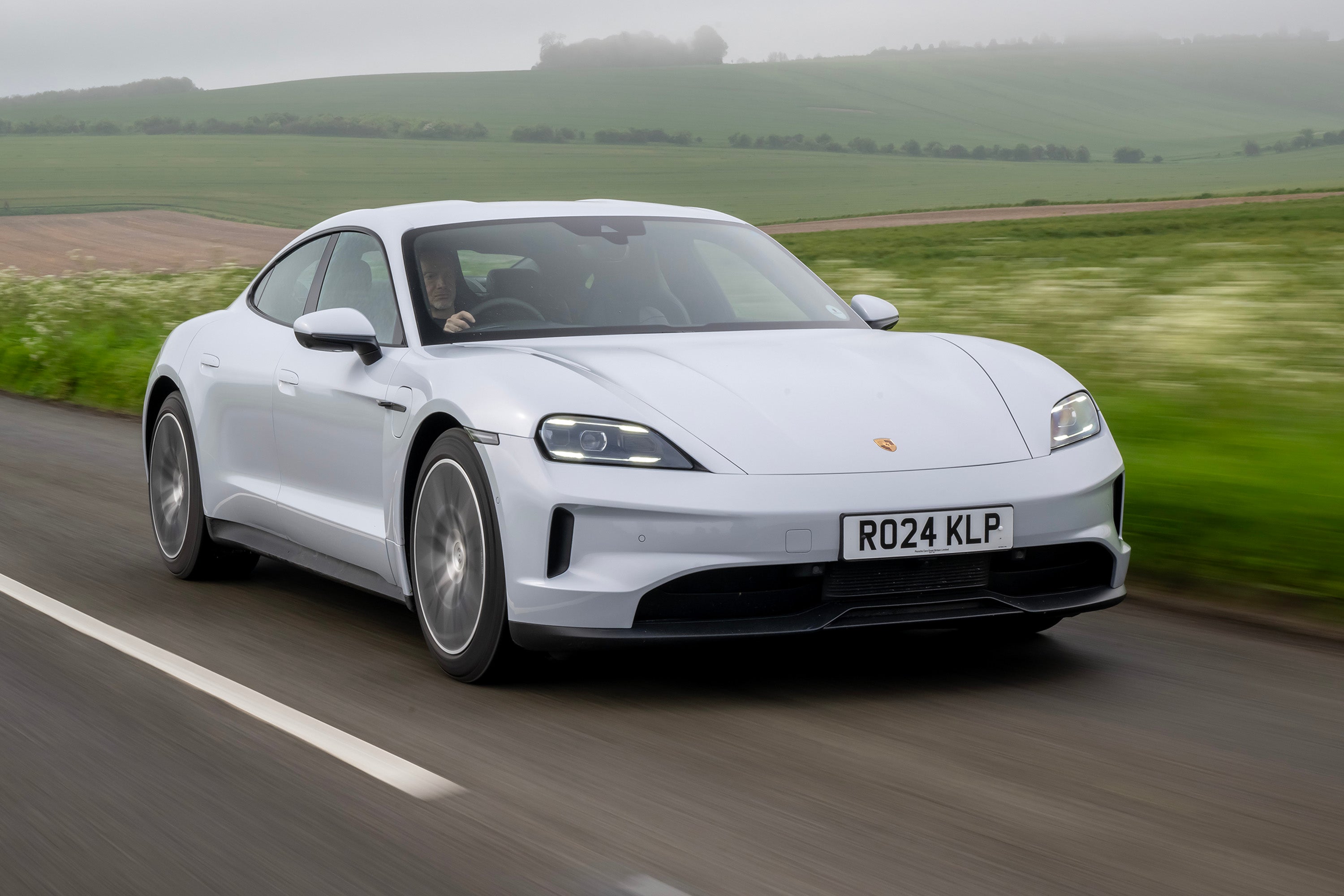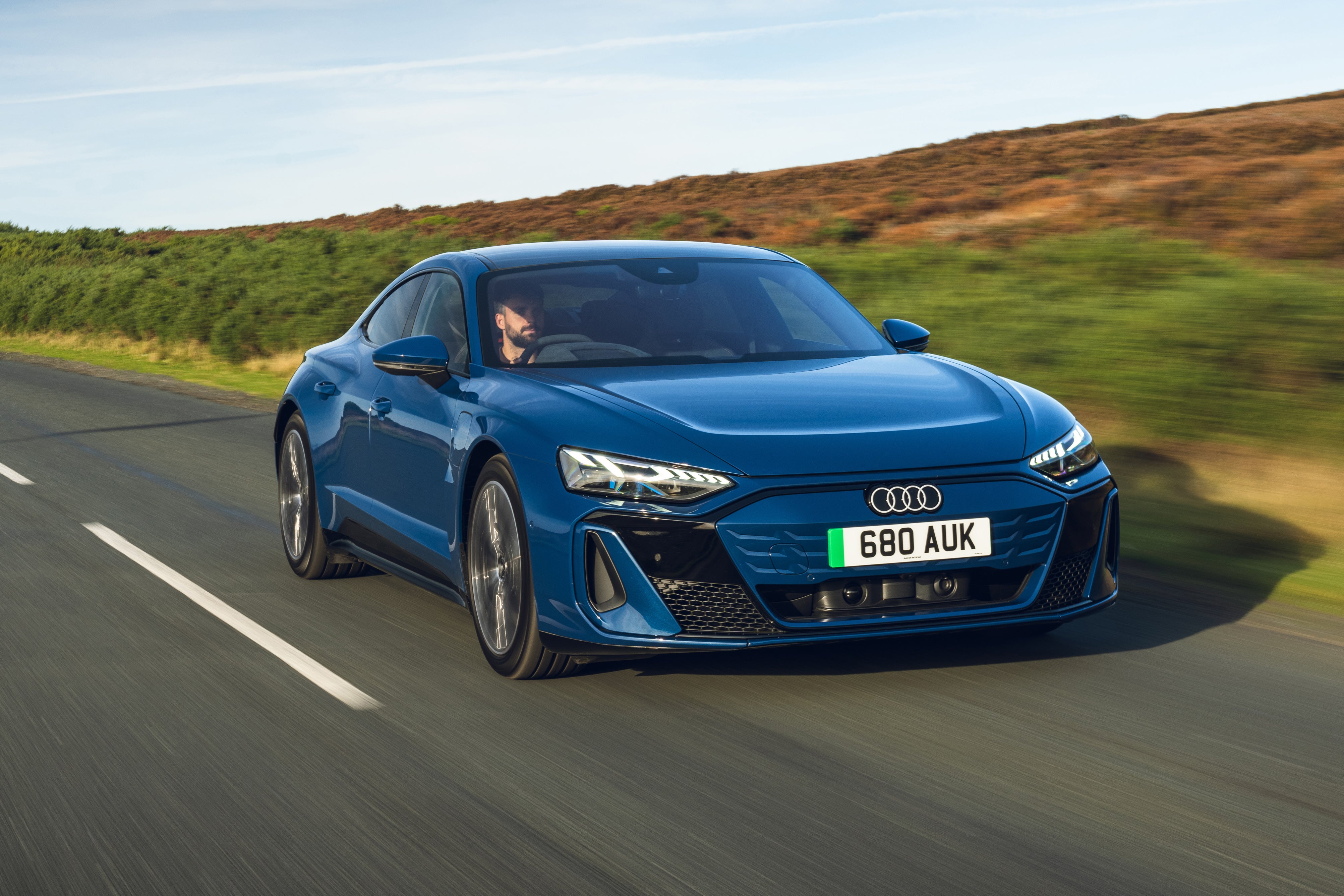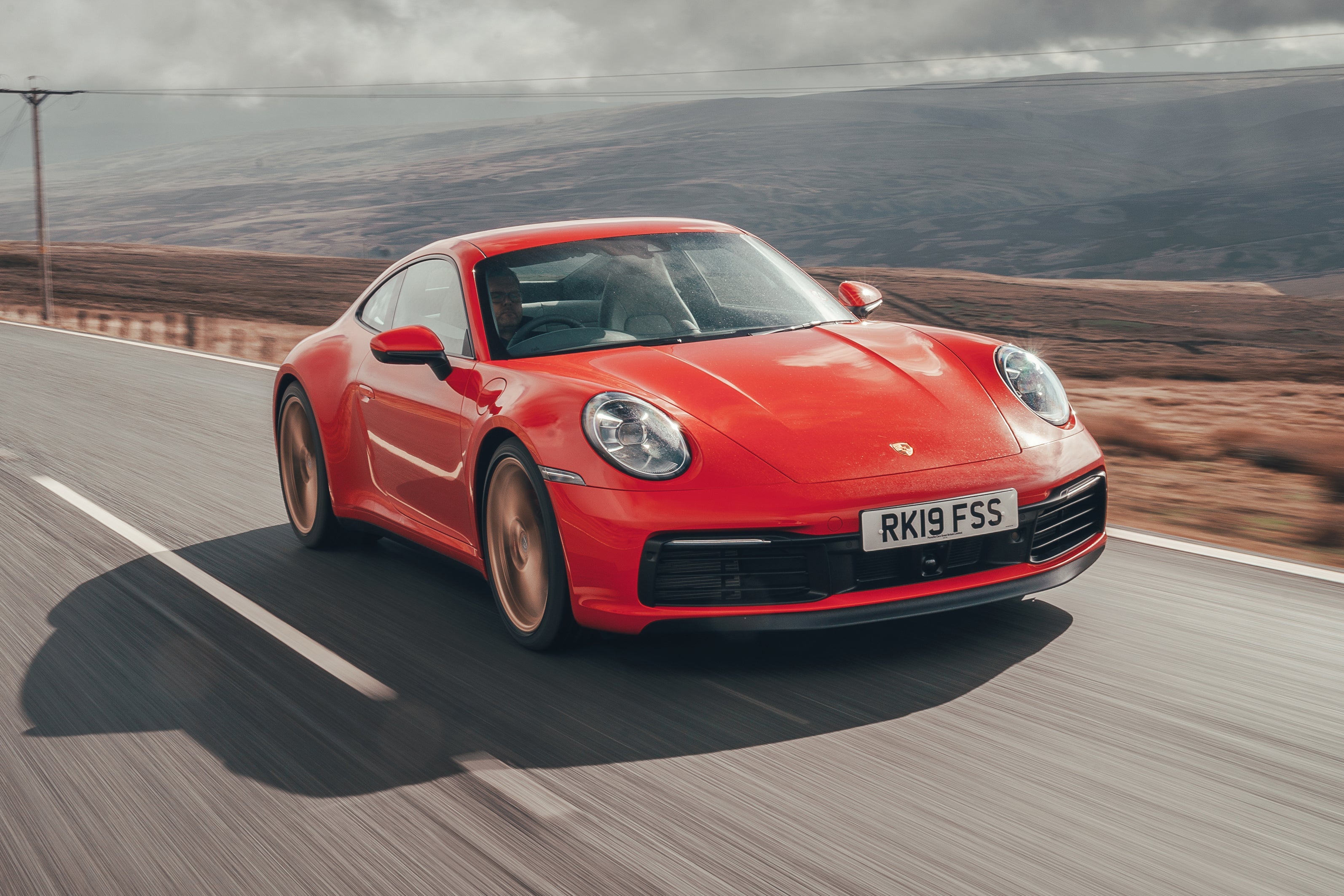
The battle to go faster and faster shows no signs of, well...slowing down. These are the fastest cars in the world right now.
The pursuit of top speed has long captivated performance car brands and continues to this day, even as the motoring world shifts into the electric age. Your 'usual' sports cars and supercars just don't cut it, so multi-million-pound hypercars continue pushing the boundaries of what's possible in terms of speed.
A hundred years ago, the race to build the fastest car had taken cars from being barely faster than horses to climbing well over 100mph in around two decades. By the 1950s, Aston Martin was breaching 150mph with its DB4 GT, while the Ferrari F40 had ventured above the 200mph barrier in the 1980s.
Getting cars to go faster than that became more and more difficult, and then the celebrated racing firm McLaren came along, blowing everyone, and everything, out of the water. In 1998, the iconic McLaren F1 fired on to its 243mph top speed at the Ehra-Lessien proving ground in Germany – well more than what anybody else could manage at the time. Its two-way average was soon clocked at 240mph.
Even when Bugatti's incredible (and incredibly expensive to make) Veyron landed on the scene in 2005, its top speed was 'only' 13mph more than the McLaren, at 253mph. But Bugatti didn't rest on its laurels, coming out with the Veyron Super Sport in 2010, which cracked 267mph.
Since then, there have been all manner of cars — some from companies you might never have heard of — that claim to be even faster still. Bugatti itself replaced the Veyron with the even quicker Chiron, and the target shifted to a nice round number: 300mph.
Although Bugatti did smash 300mph in 2019 with a lightly modified Chiron Super Sport 300+, the eventual production version was limited to a mere 271mph. Bugatti claims the production car will go to that magic figure, but it will only allow owners to take the car to its full potential under supervision at its test track.
Fastest cars in the world 2025
- Koenigsegg Jesko Absolut
- Hennessey Venom F5
- Bugatti Chiron Super Sport 300+
- SSC Tuatara
- Bugatti Mistral
- Koenigsegg Agera RS
- Bugatti Tourbillon
- Aspark Owl
- Bugatti Veyron Super Sport
- Rimac Nevera
1. Koenigsegg Jesko Absolut
Year launched: 2019

The 'fastest ever' car on sale has a caveat: like the Venom F5 mentioned further down the page, its top speed is theoretical for now and based on calculations. Still, legendary Swedish hypercar maker Koenigsegg is so confident its Jesko Absolut will deliver that it vows never to make a faster series production road car than this.
The Jesko Absolut is powered by a twin-turbo V8, which can generate "a minimum" of 1600PS on special E85 fuel. The company boss describes it as a "land-based rocket-ship determined to reach unheard-of speed in record-setting pace."
How fast exactly? Well, Koenigsegg's own target was 310mph, but the company's simulations suggest that it will go even faster than that thanks to the Jesko Absolut's super slippery, low-drag body.
The issue will be finding a long and straight bit of tarmac to get it up there. Still, it surpassed 311mph during a chassis dyno test in 2024 before hitting the rev limiter in ninth gear, meaning it’s got even more in it.
2. Hennessey Venom F5
Year launched: 2017

Hennessey has spent the last 30 years modifying everything from Ferraris to pickup trucks to Dodge Vipers. But it’s dabbled in full vehicle production twice now: first with the Lotus-derived 2011 Venom GT (capable of 270mph) and now with the super quick Venom F5.
The Venom F5 is not a Lotus Elise modified out of all recognition; instead, it's a bespoke, carbon-bodied hypercar with an in-house platform and a 6.6-litre twin-turbo V8 claimed to put out more than 1800PS. It has a kerb weight of just 1,380kg, so performance should be unhinged.
Like the Koenigsegg Jesko Absolut, Hennessey is yet to attempt a full top-speed run, although it almost did 222mph over the half mile. Still, Hennessey is hopeful the Venom F5 will reach or exceed 311mph. And we believe them. After all, it will do 0-186mph in just 8.4 seconds. All 24 made were also sold for an eye-watering £2.03m.
3. Bugatti Chiron Super Sport 300+
Year launched: 2019

No 'fastest cars' list on the internet is complete without a Bugatti or two. The 'standard' Chiron, like the Veyron before it, is a mind-blowing piece of engineering, but that doesn't mean it can't be bettered.
The Chiron Super Sport 300+ is a special version of the already special Chiron Super Sport, built to commemorate a modified Chiron becoming the first hypercar to crack 300mph in 2019 at a recorded speed of 304.773mph. The production car's top speed is electronically capped at 273mph, but Bugatti will reportedly let owners add in a roll cage and attempt their high speed at the company's Ehra-Lessien test track.
As well as a 1,600PS version of the Chiron's quad-turbo 8.0-litre W16 engine, the Super Sport 300+ gets a longer, aerodynamically optimised body and extensive weight-saving measures. 30 were built, and all sold for £3.1m each.
4. SSC Tuatara
Year launched: 2018

SSC is a name you may not have heard of, but the North American outfit held the Guinness World Record for the fastest production car for three years with the mid-2000s SSC Ultimate Aero.
Now, it's back, with the SSC Tuatara – a 1750PS hypercar using a highly tuned 5.9-litre twin-turbo V8. SSC got into some controversy in 2020 by claiming a production car record at an incredible 316mph, only for the claims to be dropped amidst issues with the data-logging side of things.
Not to be deterred, SSC had another crack with the Tuatara in early 2021, using specialist measuring gear monitored by engineers. The data they provided showed the Tuatara hit 286mph and averaged nearly 283mph on both runs – enough to smash the record held by Koenigsegg since 2017.
In 2022, it managed 295mph, but further attempts will be made as SSC wants to try and crack the 300mph barrier. The Washington-built Tuatara is said to cost around £1.63m, with 100 examples made, and not all were sold.
5. Bugatti W16 Mistral
Year unveiled: 2022

Another Bugatti to land a spot in our list is the W16 Mistral, the fastest roofless road car ever made. In November 2024, a Mistral clocked a verified 282.04mph at the Papenberg test track in Northern Germany.
It’s not the first time we’ve received a car from Bugatti that’ll naturally mould your hair. In 2012, Bugatti built the fastest roofless car, the Grand Sport Vitesse, which reached an average top speed of 254.04mph.
Suitably named after a southerly French wind, the Mistral doesn’t share a single carbon fibre body panel with the Chiron, although it does use the same carbon tub, suspension, brakes, and gearbox. To help hit its monstrous top speed is a 1,587bhp engine tune from the Chiron Super Sport.
Plans to retire the glorious W16, an engine that had been pushing Bugatti up the top speed ranks since 2005, were well in motion, and the Mistral was the last car to house all 8.0 litres of it.
Unfortunately, even if you have a spare £4.2m (before tax) gathering dust in your savings account, Bugatti has sold all 99 cars.
6. Koenigsegg Agera RS
Year launched:

There's nothing theoretical about the top speed of the Koenigsegg Agera RS. It was proven in perhaps the boldest way possible, not on a wide test track, but using a closed bit of public road in Nevada. In November 2017, Koenigsegg's test driver Niklas Lija clocked an average of 277.9mph in each direction, satisfying the requirements for a Guinness World Record for the world's fastest car.
Although the record has to be based on the average, it's worth pointing out the highest speed reached by the car was a sensational 284.6mph. To get there, the Agera RS called upon a twin-turbocharged V8 putting out a monstrous 1,360PS thanks to the fitting of Koenigsegg's '1-megawatt' package. Otherwise, the RS makes 'just' 1,176PS.
Few will ever get to experience this, with Koenigsegg only building 27 examples of the car, with the last rolling off the production line in July 2018.
7. Bugatti Tourbillon
Year unveiled: 2024

It doesn’t seem too long since the Veyron was launched, does it? The Veyron’s successor, the Chiron, bowed out in 2024, and its replacement arrived in the form of the Tourbillon, adequately named after the tourbillon watch mechanism.
So, what do we have here then? Power – all 1,800bhp of it – is derived from a hybrid V16 engine and develops a whopping 2,300Nm of torque. Given enough room, Bugatti claims it’ll hit a top speed of 277mph, making it 16mph quicker than the Chiron.
Built from the ground up, with no hint of Chiron remaining, the Tourbillon retains Bugatti’s iconic design cues such as the two-tone C-shape rear quarter, horseshoe grille and centre line.
Unlike the Chiron, which had its gearbox positioned between the driver and passenger, the Tourbillon’s is mounted behind the engine. This pushes the cabin inwards and gives a more muscular front wing design. Airflow is also improved thanks to clever engineering. Flying fenders guide air under the headlights, around the sides of the car and into vents at the rear.
On fossil fuel alone, the engine produces 1,000 bhp while three electric motors make an extra 800bhp on top.
8. Aspark Owl
Year launched: 2019

We wouldn't blame you if you'd never heard of Aspark or its questionably named Owl hypercar. But the Japanese engineering firm has been in conception since 2014, with the first customer cars appearing some ten years later in 2024. It refutes the theory that electric cars are only fast below a certain speed.
The Aspark Owl is claimed to put out an astonishing 2012PS through four electric motors – much like the Rimac Nevera, only even more powerful. Built on a carbon chassis, it's light, too, while its 64kWh battery pack means a quoted range of 280 miles.
Aspark claims the top speed is limited at 248.5mph, and the Owl can go from 0-60mph in just 1.69 seconds. In 2024, Aspark upgraded the Owl, creating a version called the SP600, which reached a scorching 272.6mph at a test track in Papenburg, Germany, making it officially the world's fastest EV.
That's in addition to its Guinness World Records that it holds in the UK, covering the quarter mile at 198.12mph and an eighth of a mile at 192.03mph. It's quick, is what we're saying.
9. Bugatti Veyron Super Sport
Year unveiled: 2010

Some within Bugatti HQ must have been pretty miffed when a small company nabbed the original Veyron's production car speed record with the SSC Ultimate Aero, a low-volume supercar powered by a modified Chevrolet engine.
It answered back in stunning fashion a few years later, though, with the Veyron 16.4 Super Sport, which upped the output from the 'regular' Veyron's 1,001PS 8.0-litre, quad-turbo W16 to 1,200PS. It comfortably eclipsed the 256mph set by the SSC by clocking 267.91mph at VW's Ehra-Lessien test track.
There was some controversy over Bugatti removing the car's 258mph top speed limiter, in place on customer Super Sports to protect the tyres, leading to the record briefly being pulled by Guinness. It was reinstated a week later.
It'd hold that record a lot longer than the two and a half years the Veyron 16.4 stayed at the top. More than seven years passed before Koenigsegg came along and nabbed the title of world's fastest.
10. Rimac Nevera
Year launched: 2021

The Nevera is built by Croatian company Rimac, which owns a controlling stake in Bugatti alongside Porsche. Its EV hypercar is capable of 258mph flat-out, putting it right up there with the quickest petrol-powered cars.
The Nevera, which puts out a combined 1900PS from four electric motors powering each individual wheel, can accelerate from 0-62mph in under two seconds and cover the quarter mile in 8.6 seconds. Of course, we know EVs can be lightning fast away from the line, but to stop the Nevera's acceleration tailing off, Rimac uses a pair of single-speed transmissions.
There's more technical innovation in the Nevera than just raw speed, with extremely clever torque vectoring and a chunky 120kWh battery, which is claimed to give a range of 340 miles. It also has the most powerful regenerative braking of any EV, capable of up to 300kW of power.
Priced from £1.72m, 150 examples are set to be produced, but Rimac is having a tough time selling them all. Company founder Mate Rimac reckons this is down to well-heeled hypercar buyers preferring combustion-powered vehicles when spending seven-figure sums.
Recommended cars for you
Porsche 911S 2dr PDK
20244,274 milesPetrol£166,990
TS183TAPorsche 911GT3 2dr
20237,337 milesPetrol£1,916 mo£159,995
NE289NDPorsche 911GTS 2dr PDK
20236,567 milesPetrol£1,535 mo£114,800
S92FZPorsche 911GTS t-Hybrid 2dr PDK
2025446 milesPetrol£1,796 mo£143,990
LS126BGPorsche 911GT3 2dr PDK [Touring Pack]
2025100 milesPetrol£3,289 mo£237,800
S92FZPorsche 911S 2dr PDK
202021,844 milesPetrol£2,041 mo£139,850
NE289NDPorsche 911GT3 RS 2dr PDK
2025263 milesPetrol£3,487 mo£263,000
S92FZPorsche 911S 2dr PDK
20251,500 milesPetrol£1,746 mo£134,990
LS126BG
Car deals
Whether you're looking for a great PCP deal or looking for a car on 0% finance, we've got the car deal for you


